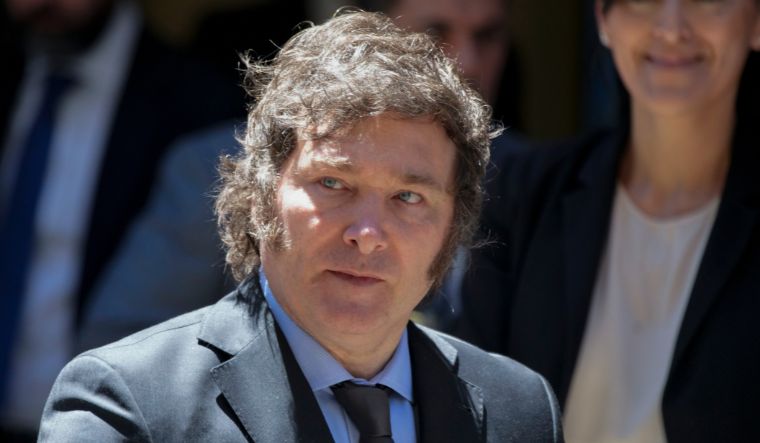"If we don't change the economic model from the very roots, then Argentina has no future," said Argentina's unconventional President Javier Milei in a high-stakes gambit that has captured global attention.
In a fiery speech before the Congress at the opening session of its 142nd legislative term, he unleashed a whirlwind of controversial economic reforms, setting the stage for a dramatic showdown with the Congress and igniting a fierce debate about the future of Latin America's third-largest economy.
Echoing his campaign promises to upend Argentina's political establishment, Milei unveiled a new package of bills designed to accelerate his ambitious economic reforms.
The speech, delivered before a divided Congress, laid bare the president's determination to push ahead with his agenda, even as protests mounted outside the legislative chamber and lawmakers bristled at his confrontational tone.
A gauntlet thrown: Milei's ultimatum
Milei's message to Congress was clear: Join him in his quest to transform Argentina, or risk being left behind. The president vowed to press forward with his reforms "by law, presidential decree, or by modifying regulations," a stark reminder of his willingness to bypass the legislature if necessary.
This uncompromising stance reflects Milei's deep-seated conviction that Argentina's economic woes can only be solved through a radical overhaul of the system. By challenging Congress to pass his new package of bills, Milei is effectively daring lawmakers to either embrace his vision or face the political consequences of obstruction.
The pillars of Milei's plan: Austerity and accountability
At the heart of Milei's new legislative push are two key priorities: slashing government spending and holding politicians accountable for fiscal irresponsibility. The president's proposals include cutting perks for lawmakers, such as private jets, and stripping federally provided benefits from politicians convicted of corruption.
Milei's tough stance on political privilege reflects his broader commitment to austerity and his disdain for what he sees as Argentina's entrenched "caste" of elites. By targeting the perks and privileges of the political class, Milei is tapping into a deep well of public anger and frustration with the status quo.
Perhaps most significantly, Milei vowed to introduce legislation that would penalise anyone, including the president and lawmakers, who signs off on financing a fiscal deficit by printing more money.
This move underscores his determination to break Argentina's cycle of inflation and economic instability, even if it means taking on powerful interests within his own government.
Yet Milei's aggressive approach has also sparked fears of further instability and hardship, particularly among workers and unions who fear that his austerity measures will leave them even worse off.
The president's vow to limit the terms of union leaders is likely to further inflame tensions and could lead to more strikes and protests in the coming months.
Milei, a 53-year-old political outsider who swept to power last year on a wave of public fury over Argentina's economic woes, has wasted no time in implementing his radical agenda.
In just 82 days, the president has devalued the peso by more than 50 per cent, slashed state subsidies, cut tens of thousands of public sector jobs, and scrapped hundreds of regulations in a bid to deregulate the economy and tackle the country's crippling fiscal deficit.
While Milei's supporters hail these measures as a necessary shock to the system, critics argue that they will exacerbate poverty and inequality in a nation where nearly 60 percent of the population already lives below the poverty line.
The decision to freeze aid to 38,000 soup kitchens pending an audit has been particularly controversial, with many warning that it could push vulnerable families to the brink.
Is Argentina a nation on the brink?
Faced with stiff resistance from the Congress and a mounting wave of legal challenges, Milei has sought to rally support for his reforms by reaching out to influential provincial governors, party leaders, and former presidents.
His proposed "new social contract" for Argentina, based on 10 core principles, including a balanced budget and reduced public spending, represents a bold attempt to forge a consensus around his vision.
However, with over 60 lawsuits already underway and the threat of further legal battles looming, Milei faces an uphill battle to implement his agenda.
His threat to bypass the Congress and enact reforms by presidential decree has only heightened tensions, raising concerns about the state of Argentina's democracy and the potential for social unrest.
As Argentina grapples with the fallout from Milei's economic blitz, the world is watching closely to see whether his high-risk strategy will pay off.
Some analysts argue that the president's bold approach is exactly what Argentina needs to break free from decades of economic mismanagement and restore investor confidence. Others warn that his policies could push the country to the brink of collapse, with devastating consequences for ordinary Argentines.
Regardless of the outcome, one thing is clear: Milei's presidency has become a defining moment for Argentina and a critical test case for the region as a whole.
As the drama unfolds in Buenos Aires, the eyes of the world will be on this maverick leader and the nation he seeks to transform, with far-reaching implications for the future of Latin America and beyond.



